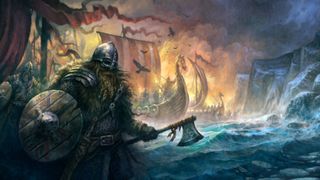Paradox: 'There's room for improvement in how we present our DLC'
In order to prevent inundating players with expansions and add-ons.

Crusader Kings 2 is to this day one of Paradox's most popular grand strategy games. Since launch in 2012 it has received 24 paid DLC packs with a variety of expansions, unit bundles and customisation features. If you buy all of them alongside the CK2 base game, it costs over $300 in total.
At PDXCon 2018, I suggest to incoming CEO Ebba Ljungerud and business development VP Shams Jorjani that the developer's long-term DLC model has scope to overwhelm new players.
"We want to make really great games for the customer, and that's the outlook," explains Ljungerud. "We're not going to be able to do that if we can't charge something for the development of the games. That's the base of it. You can then discuss margins and this and that, but if we don't make money we're not going to make the game. That's where we're coming from. For us, it's not so strange that we actually charge people for content and better improvements of the game.
"With Crusader Kings 2, you could say, yeah, it's a lot of money over the years—but it's also a game with a lot of hours and a lot of gameplay within it. So, I can't say that I think it's wrong for charging for the development of the games."
Jorjani interjects: "I argue: go out and find any other game that can offer you this many hours of gameplay at the base cost and never [require] any more DLC. If you're not a religious Paradox player and you've never encountered our games, and just buy vanilla, I think we're in the top one percent in the industry, in terms of value that we provide back. Green Man Gaming now puts in a value that tells you the amount of hours and money spent. There was a big discussion [on social media] about how terrible this is. But I love it!
"On the other hand, we're pretty… not bad, but there's room for improvement in how we present our DLC. We have to deal with the issue of people being conditioned by other games and how the industry works. The conditioning is: if you don't get all the content, the thing is broken, you're missing out on something. Which is not true in our games."

Jorjani says Paradox must better present the surplus post-launch expansions its games offer, so as to avoid inundating players with DLC. Jorjani adds that it's easy to deride "fucking more DLC" in 280 characters, than it is to have sensible conversations about what you like and dislike—and that the premium business model is nevertheless shrinking. Conversely, free-to-play practices are growing.
"If I'd gone to Henrik [Fåhraeus] and said in 2018 we're going to have $300-worth of DLC, he would've smacked me across the face," Jorjani adds. "So, today I can walk in and have $30,000-worth of content to sell in six years and people don't smack me. Because if we look at what's going on in the industry as a whole, the premium business model is shrinking. That part of the industry is shrinking. That doesn't mean you can't thrive and grow, but as a whole, our focus as a company is growing. What's growing is free-to-play.
The biggest gaming news, reviews and hardware deals
Keep up to date with the most important stories and the best deals, as picked by the PC Gamer team.
"Our games perhaps don't transfer over that well over to free-to-play. So, the interesting [question] is: what is the convergence point that we see in hybrid models, where there is a premium starting price point, but there are other ways to charge for content without upsetting everyone? That's the real challenge for us in the next five to ten years—and how we present that."

If you love big trucks, establishing trade routes, and the phrase 'post-apocalyptic survival business simulator' then I've got just the strategy RPG for you

Blizzard veteran David Kim's strategy comeback with Battle Aces is 'very personal:' 'I just can't accept... the end-all peak of RTS is StarCraft 2 and nothing can ever be better'
Most Popular






